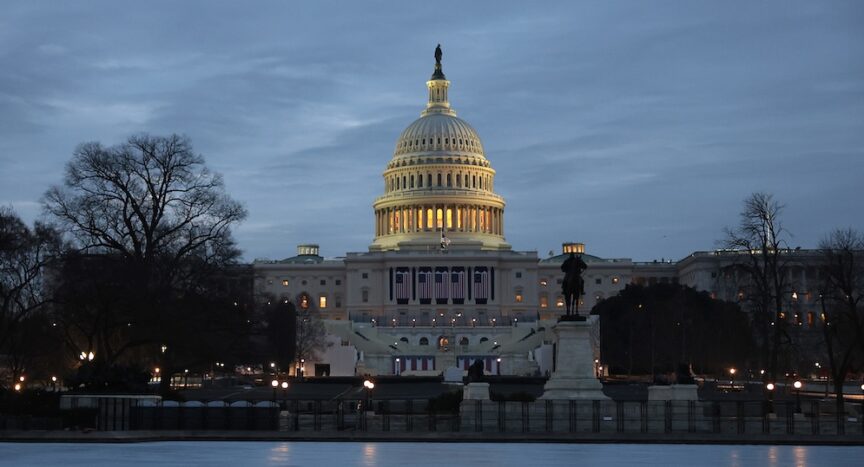In the history of all presidential inaugurations in the United States, the transition of power has been accompanied by an implied sense of pomp and circumstance. From the swearing-in ceremony to the parade to the inaugural balls, it signifies a new era in American life and politics, putting aside partisanship to unite the American people.
The last time a presidential inauguration was moved indoors was in 1985 when Ronald Reagan took office for the second time, and Reagan decided to shield the ceremony from harsh winter weather. Forty years later, Donald Trump will be sworn into office inside the Capitol building rotunda, the same place his supporters carried out an insurrection four years earlier. The shift of Trump’s second inauguration to an indoor ceremony due to frigid temperatures is parallel to the rigid, forceful transition of power that, for many Americans, is a hard pill to swallow.
On Dr. Martin Luther King Jr. Day, a day meant to honor justice and equality, the gravity of this moment feels particularly stark, given Trump’s skewed campaign built on lies and an authoritarian sense of patriotism. The incoming administration has shown the American people they are hellbent on upending equitable systems put in place that directly contradict the messaging of Dr. King.
The day after the inauguration, Trump already committed to initiating mass deportations in major American cities and undoing key Biden-era immigration and climate change policies. The irony of “bad weather” on inauguration day symbolizes the tone of a cold, dreary, and uncertain day in American politics.
The melancholic tone can be felt throughout Washington, with many notable figures like Michelle Obama opting out of participation and Former Presidents Obama, Bush, and Clinton choosing to skip Trump’s inaugural lunch. No spokesperson for any former president has provided a direct reason for skipping. Inauguration Day is typically one of the rare occasions all former living presidents and their significant others are seen together. This lack of solidarity reflects the profound fractures within the country.
Along with the incoming administration celebrating what could be one of the most fearful days in history for millions of Americans is the “support” coming from beloved figures in the Black community.
In the days leading up to the inauguration, rappers Nelly, Snoop Dogg, Rick Ross, Rod Wave, Kodak Black, and Fivio Foreign were named as performers and former athletes Mike Tyson and Antonio Brown were announced as attendees. Whether they realize it or not, their visible participation plays directly into Trump’s strategy of leveraging high-profile Black voices to create a façade of inclusivity and credibility––think Amber Rose, Tim Scott, Ben Carson and Herman Cain.
This tactic is nothing new for Trump, but it stings all the more given his long history of racism, from his refusal to rent to Black tenants in the 1970s to his relentless attacks on the now-exonerated Central Park Five. The truth is, it’s a slap in the face. Their boast of diverse representation is untrue, being that Hershel Walker’s laughable role as Ambassador to the Bahamas is the only Black representation we will see in Trump’s cabinet. For millions, the sight of such performative support feels like a betrayal, and many have even chosen to tune out during one of the most pivotal moments in our nation’s history.
Donald Trump’s first administration was often criticized for its lack of Black representation. The truth appears to be the same in 2025, and this lack of representation exacerbates tensions, especially when paired with instances of performative gestures, such as inviting artists from diverse backgrounds for appearances or events. These performative gestures add salt to the wound on top of his harmful policies as Trump continues to wield his power to control influence.
Even before taking office, Trump began asserting his influence and power in ways that demonstrated his ability to shape public narratives. His use of social media, particularly Truth Social and Twitter (now X), as a direct communication tool allowed him to bypass traditional media gatekeepers and dominate the news cycle.
Meanwhile, the American people are distracted by performative issues such as Trump’s obsession with changing the name of the Gulf of Mexico. Additionally, the ongoing tug-of-war between the outgoing and incoming administrations and ByteDance over the TikTok ban has drawn attention away from Trump’s more dangerous policies. By championing the app, Trump appears to be positioning himself as a hero to younger generations while obscuring the immediate harm his administration plans to inflict.
Adding another layer to this moment of political theater, Trump recently pledged to release long-classified files related to the assassinations of John F. Kennedy, Robert Kennedy, and Martin Luther King Jr. While framed as a move toward transparency, this announcement feels more like a distraction, aimed at redirecting public attention from his regressive policies and controversial second-term agenda. The timing, particularly on Martin Luther King Jr. Day, underscores the performative nature of this promise, raising questions about Trump’s motives and the potential exploitation of these historical tragedies for political gain.
While the nation watches Donald Trump take the oath of office for a second time, the symbolism of this moment is impossible to ignore. Beneath the veneer of tradition lies a stark reminder of the fragility of unity and progress. For millions, this inauguration does not mark a celebration but a call to vigilance. In the shadow of uncertainty and division, the weight of Trump’s volatile history as a leader of our nation reminds us to block out anything to distract us from the truth, remain woke, and, frankly, keep our heads on a swivel.
As Inauguration Day sunsets and proceeds into the second Trump administration, we remember the words of Dr. King: “Faith is taking the first step even when you don’t see the whole staircase.”



